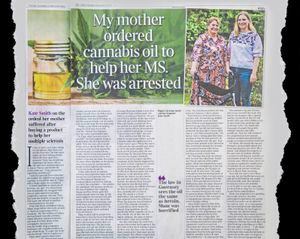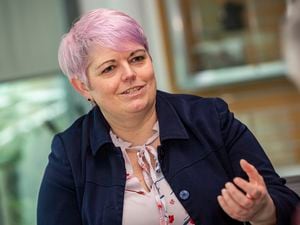MS sufferer with cannabis oil conviction ‘still in daily pain’
A MULTIPLE SCLEROSIS sufferer convicted for importing cannabis oil is still without respite from her daily pain, her daughter has told a national newspaper.

Kate Smith, the daughter of Christine Smith, 65, who was last month handed a two-year suspended prison sentence for importing tetrahydrocannabinol, a class A cannabis derivative, wrote a first-person piece about her mother’s ordeal in The Times.
Published yesterday, Miss Smith’s article describes the anger she has towards the authorities for pursuing her mother’s conviction.
‘Mum was desperate to try anything that might help her situation, determined to get better not just for herself, but so she can be there for me and my sister,’ she wrote.
‘As a consequence she was humiliated and mistreated. After everything she has fought to overcome, she deserves better.
‘The morning after Mum called to tell me about her arrest, she worried that I would be angry with her. She dreaded telling me, rushing the words like I did after breaking something as a child.
‘She had a right to worry – I am angry, but not at her.
‘I’m angry at the individuals who made the decision to prosecute in this case.
‘I’m angry at those who for so long ignored the therapeutic benefits of cannabis and forced vulnerable people with few options to take desperate measures. That’s the real crime here.’
Miss Smith described how her mother’s multiple sclerosis has worsened since the court case.
‘Now that the case is over, mum can rest, but her health has worsened and she is still without any respite from her daily pain.’
Her mother’s criminal record meant that she would not be able to visit Miss Smith’s daughter, who lives in Canada.
Mrs Smith was arrested for importing the substance after a friend offered to send some in the post. The friend had heard of the benefits of the substance.
Miss Smith said her mum had not thought twice about taking her friend up on the offer. For five years, she said, the disease had spread across her mother’s brain like fire.
But the cannabis never arrived.
‘Early one morning Mum was asleep in bed after yet another long, restless night. She woke to knocking at the door.
‘She got out of bed as quickly as her legs would allow and put on her dressing gown,’ stated Miss Smith.
‘When she finally reached the door, she opened it to three border agents and two police officers, accompanied by the startled-looking day manager [of the assisted living facility where she lives].’
Miss Smith said the officers searched the flat and she was asked to choose some clothes and take a shower under the supervision of a female border agent.
‘While the search continued, she was arrested and taken by car to the police station.
‘Three hours and 45 minutes later she was interviewed. By this time Mum was overcome by sensory overload, which is one of the many cognitive symptoms of the disease, triggered by too much activity, exposure to crowds and new environments.’
She said it caused confusion and made it difficult to think properly. Subsequently, Mrs Smith said she did not need an advocate.
‘Naively, she admits, Mum thought honesty was the best policy.’
She said despite progress in the UK and Guernsey to legalise medicinal cannabis, it was unclear whether cannabis oil would become available on prescription in the UK.
‘What’s more, there are no plans to update the classification of cannabis oil in Guernsey’s drugs legislation and prevent situations such as Mum’s from recurring.’
Following Mrs Smith’s conviction, Health & Social Care said medicinal cannabis was already available to help those with MS in Guernsey.
Some cannabidiol oil products, which contain a constituent of cannabis, have been de-criminalised and are available in shops. However, medicinal cannabis is still strictly controlled in the island.
Anyone wanting to use medicinal cannabis has to apply to Health & Social Care for a licence. So far fewer than five applications have been made.
With regard to the treatment of MS, HSC said a form of medicinal cannabis – Sativex – was already approved and a number of people in the Bailiwick received it on private prescription. Prescriptions must be requested initially by a consultant.





